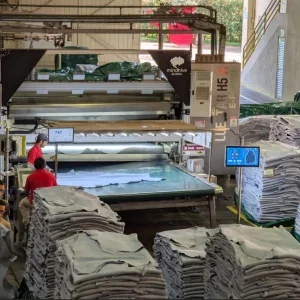Leather or not leather, that is the question. While some see the use of leather as encouraging animal abuse, others single it out for its heavy impact on the planet, in particular the processes of breeding and tanning. It's a sensitive issue and one that brands are increasingly concerned about, as they weigh the pros and cons of using leather or a leather alternative in order to make informed decisions. Because although leather production can be harmful to the planet, its resistance and longevity make it an essentially sustainable material, especially since the industry is now confronting the subject head-on in order to reduce its carbon footprint.
That's the case with Mulberry, which today presents a collection of handbags created from the leather that is claimed to have the world's lowest carbon footprint To achieve this feat, the British luxury house chose to produce the collection in partnership with Muirhead, a family-owned company known for its high-quality, eco-friendly leather, and to have it manufactured by artisans in its carbon-neutral factories in Somerset, England.
This capsule collection is created from raw hides sourced exclusively from the UK and Ireland, tanned and processed in the Muirhead production site located in Scotland, before the bags are therefore manufactured in Somerset. A "hyper-local" and "hyper-transparent" process, according to the luxury house, which results in a leather with a very low carbon footprint — 1.1 kg of CO2 per hide. The use of a thermal power plant that produces heat from waste, as well as the filtration and recycling of 40% of wastewater to produce the leather, contribute to making this low footprint possible.
"We are delighted to form a strategic partnership with global British brand Mulberry, to support their sustainable and responsible business goals. Muirhead developed the lowest carbon soft and supple leather for the fashion industry to reduce carbon intensity even in the high luxury segment," explained Muirhead managing director Nicholas Muirhead.






